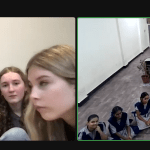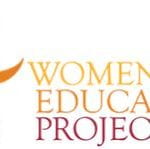
On Tuesday, January 28th, my social justice group zoomed with The Aarti Home students who are based in Andhra Pradesh, India. The Aarti Home is a shelter/program that makes sure girls are recognized and educated so that they can have a promising future. They find children who are neglected by families or maybe abused into exploitation and help them create dreams and a healthy vision of what they want to be. We got this interview opportunity from Zoe Timms, the founder of The Women’s Education Project, because she was another expert that we conferenced with that had ties with the Aarti Home. Zoe set up a virtual call for us to get personal with other girls our age and learn more about what their day to day life looks like.
Beforehand, Zoe told us that we shouldn’t just ask what the girls’ experiences were or how they got to where they are now, but more like a friendly conversation that asked about favorite classes and songs. She also told us that we could share an American snack or meal that would be new to the students. My social justice group decided on a peanut butter and jelly sandwich. We got strawberry jelly in a squeezy tube, white bread, and of course the peanut butter, to make the recipe as stereotypically American as possible. When the time came, we hopped on the meeting and introduced ourselves. The Aarti Home students then greeted us and told us that they were going to make their favorite dish, dosa. Unfortunately, the zoom was very glitchy, but we still got an understanding of what was going on. It was very fun to watch and I appreciated their willingness to show us something new.
Then it was our turn to make the sandwich. We set up plates and laid out everything we needed. We made sure to specifically describe each item and explain a step by step tutorial on how to assemble it. Once we finished, we showed them the finished product and they seemed very interested. Moving on from the cooking demonstration, the Aarti Home girls started to ask questions about what hobbies we enjoyed doing and what we wanted our career to be. We answered with things like dancing and playing tennis when all of a sudden one girl in the shelter said that she also really liked to dance. Once she said that, everyone else got super excited and the girls decided that they were going to show us some moves. They put on some music and performed a whole choreographed dance that we were not expecting. Once the dancing stopped, they asked us if we could do the same. We did not know how to respond but ended up doing the macarena. It was genuinely really fun and we had a great time. We asked a couple more questions and then the girls said that they had to go because there is quite a big time difference. It was about 9:00 pm at night and they had to get some rest. We waved goodbye and shut the computer.
Looking back on the experience now, it was so interesting to be able to do something like this. We exchanged many smiles and it was very chill and laid back. My social justice group is very lucky to have gotten to do this and we are grateful that it worked out.








